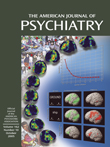Treatment of Cognitive Impairment in Early Psychosis: A Comparison of Risperidone and Haloperidol in a Large Long-Term Trial
Abstract
OBJECTIVE: Cognitive impairment is a major determinant of functional outcome in schizophrenia. Treatment of cognitive impairment at the time of the first episode may have the potential to change functional outcomes of the illness. This study examined changes associated with treatment with risperidone compared with haloperidol in aspects of cognitive functioning known to be associated with functional outcomes. The study was conducted in a large group of patients experiencing their first episode of schizophrenia. METHOD: Cognitive assessments were conducted in 533 patients experiencing their first episode of schizophrenia or a related psychosis who had been randomly assigned to receive low doses of risperidone or haloperidol. The cognitive assessments were repeated at several different follow-up intervals; 359 patients were reexamined at the 3-month follow-up. The assessments included examinations of verbal and visuospatial episodic memory, vigilance, executive functioning, processing speed, and verbal fluency. Patients’ clinical symptoms were also rated with the Positive and Negative Syndrome Scale. RESULTS: Improvements from baseline were found in the risperidone-treated patients for episodic memory, verbal fluency, vigilance, executive functioning, and visuomotor speed. Haloperidol-treated patients also showed improvements from baseline in episodic memory, vigilance, and visuomotor speed but not in executive functioning or verbal fluency. Comparison of differential treatment effects on a composite measure of cognitive functioning found that risperidone was significantly more beneficial than haloperidol after 3 months of treatment. Changes in Positive and Negative Syndrome Scale scores were correlated overall with improvement in the haloperidol-treated patients but not in the risperidone-treated patients. CONCLUSIONS: Treatment with risperidone at the time of the first episode of schizophrenia is associated with wide-ranging improvements in cognitive functioning. Overall improvement is significantly greater with risperidone than with haloperidol. Further, cognitive improvement associated with treatment with risperidone was not influenced by changes in symptoms, but that relationship was significant in haloperidol-treated patients.



